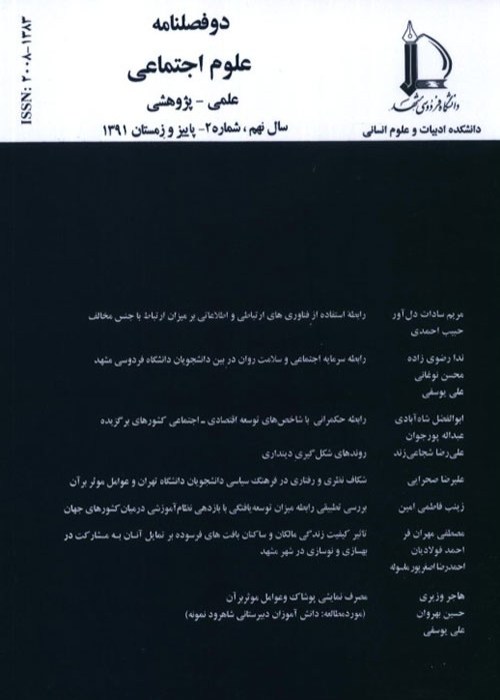The Relationship between Organizational Learning and Job Satisfaction of Staff Using Structural Equation Modeling: A Case Study of Kermanshah
Author(s):
Article Type:
Research/Original Article (دارای رتبه معتبر)
Abstract:
IntroductionOne of the issues discussed by social science researchers is organizational life and, in particular, job satisfaction. Job Satisfaction is the common theme of all organizations, and therefore analyzing and recognizing it is the main concern of all thinkers of the humanities. One of the factors that can affect job satisfaction is organizational learning. The main purpose of this paper is to investigate the relationship between organizational learning and job satisfaction of employees with an emphasis on Kermanshah government departments.
In this study, Parsons (1977) theoretical view is used. He believes that organizations need to solve their four tasks for survival and progress over time: 1. Achievement of goal; 2. Adaptation; 3. Integrity; 4. Preservation of the pattern. Parsons considers the organization as a social system based on a larger social system, that is, society, and on this basis, the concept of job satisfaction (Parsons, 1965, p. 30) is set forth.
2. Theoretical Framework
Feldman (1987) thinks that the process of socialization in organizations has three stages:1. The first stage is the stage before entering the organization or the preliminary stage. The person has a series of general information about the organization.
2. The second stage is the stage of confrontation or adaptation. A person faces the reality of the organization and knows the roles of himself and others.
3. The third stage is the stage of metamorphosis or role management. The individual either adapts himself to the organizational culture or leaves the expected organization. At this stage, the person knows his or her own job restrictions and those of the others, and he is to perform as part of the role he plays (Saatchi, 2008, p. 277).
Senge (1992) considers the five principles or disciplines of individual skills, mental models, common goals, team learning, and systemic thinking are essential in organizational learning.
MethodologyIn this research, 377 people were surveyed by Kermanshah public administration staffs whose total number was 14777 people. They were studied by stratified random sampling and Linn table sampling method. Factor analysis was used to estimate the validity of the two concepts of job satisfaction and organizational learning. Five-dimensional organizational learning (personal skill, mental model, common goal, team learning, and system learning) was measured.
Results & DiscussionThe results show that the mean job satisfaction of employees is 40.23, which is lower than the expected mean (45) and indicates a low level of employee satisfaction. There is a significant and positive relationship between organizational learning and job satisfaction (r = 0. 495), and this is a generalizable result for the entire statistical population. The results of the functional model of the organizational learning variable show that the non-significant Chi-Square of the CMIN is 263.77 and the significance level of 0.0000 does not show a good result. The second RMSEA is 0.053 which is close to zero and confirms the fitness of the model. The value of the RMR index or root mean square of the residuals is 0.046, which is close to zero and confirms the fitness of the model. The CMIN/DF was used for assessing the model, the value of which is 1.84, and that one in turn represents a recovery condition for the model. The comparative fitting index of CFI is 0.933, which shows good results. For PCFI adaptive fit index, values of 0.50 and above are acceptable. The results show the values of this index is 0.702.
SuggestionsBased on the findings of this study, job satisfaction is directly affected by organizational learning. In other words, increase of organizational learning of employees lead to their job satisfaction changes. The correlation coefficient for this variable is 0.45, which indicates a strong, direct and significant relationship between the two variables. This result can be explained in the form of a social learning perspective. In the theory of social learning, it is assumed that people that are new in an organization are free of inter-organizational processes that become organizational entities through the influence of the organizational world. Such a person learns in the organization to attract parts of the behavior that will make him unique. Based on Bandura's (1977) social learning theory, one of the most fundamental tools for modeling a new behavior is to personally view behavior and adapt with it. Generally, having dedicated and loyal committed employees is the most important factor in the success of any organization. The main priority for any company should be to attract and retain committed and competent employees. Failure to realize this means losing productivity, a lack of growth and a loss of business. Success in a competitive world belongs to companies that consider committed and loyal employees as their greatest capital. Many scholars have argued that human resources are the only competitive advantage that organizations need, and they should turn this potential force into action by taking appropriate actions and directing them to the organization. Lack of human resources can never achieve their goals. In other words, human resources play a key role in maintaining market competition.
In this study, Parsons (1977) theoretical view is used. He believes that organizations need to solve their four tasks for survival and progress over time: 1. Achievement of goal; 2. Adaptation; 3. Integrity; 4. Preservation of the pattern. Parsons considers the organization as a social system based on a larger social system, that is, society, and on this basis, the concept of job satisfaction (Parsons, 1965, p. 30) is set forth.
2. Theoretical Framework
Feldman (1987) thinks that the process of socialization in organizations has three stages:1. The first stage is the stage before entering the organization or the preliminary stage. The person has a series of general information about the organization.
2. The second stage is the stage of confrontation or adaptation. A person faces the reality of the organization and knows the roles of himself and others.
3. The third stage is the stage of metamorphosis or role management. The individual either adapts himself to the organizational culture or leaves the expected organization. At this stage, the person knows his or her own job restrictions and those of the others, and he is to perform as part of the role he plays (Saatchi, 2008, p. 277).
Senge (1992) considers the five principles or disciplines of individual skills, mental models, common goals, team learning, and systemic thinking are essential in organizational learning.
MethodologyIn this research, 377 people were surveyed by Kermanshah public administration staffs whose total number was 14777 people. They were studied by stratified random sampling and Linn table sampling method. Factor analysis was used to estimate the validity of the two concepts of job satisfaction and organizational learning. Five-dimensional organizational learning (personal skill, mental model, common goal, team learning, and system learning) was measured.
Results & DiscussionThe results show that the mean job satisfaction of employees is 40.23, which is lower than the expected mean (45) and indicates a low level of employee satisfaction. There is a significant and positive relationship between organizational learning and job satisfaction (r = 0. 495), and this is a generalizable result for the entire statistical population. The results of the functional model of the organizational learning variable show that the non-significant Chi-Square of the CMIN is 263.77 and the significance level of 0.0000 does not show a good result. The second RMSEA is 0.053 which is close to zero and confirms the fitness of the model. The value of the RMR index or root mean square of the residuals is 0.046, which is close to zero and confirms the fitness of the model. The CMIN/DF was used for assessing the model, the value of which is 1.84, and that one in turn represents a recovery condition for the model. The comparative fitting index of CFI is 0.933, which shows good results. For PCFI adaptive fit index, values of 0.50 and above are acceptable. The results show the values of this index is 0.702.
SuggestionsBased on the findings of this study, job satisfaction is directly affected by organizational learning. In other words, increase of organizational learning of employees lead to their job satisfaction changes. The correlation coefficient for this variable is 0.45, which indicates a strong, direct and significant relationship between the two variables. This result can be explained in the form of a social learning perspective. In the theory of social learning, it is assumed that people that are new in an organization are free of inter-organizational processes that become organizational entities through the influence of the organizational world. Such a person learns in the organization to attract parts of the behavior that will make him unique. Based on Bandura's (1977) social learning theory, one of the most fundamental tools for modeling a new behavior is to personally view behavior and adapt with it. Generally, having dedicated and loyal committed employees is the most important factor in the success of any organization. The main priority for any company should be to attract and retain committed and competent employees. Failure to realize this means losing productivity, a lack of growth and a loss of business. Success in a competitive world belongs to companies that consider committed and loyal employees as their greatest capital. Many scholars have argued that human resources are the only competitive advantage that organizations need, and they should turn this potential force into action by taking appropriate actions and directing them to the organization. Lack of human resources can never achieve their goals. In other words, human resources play a key role in maintaining market competition.
Keywords:
Language:
Persian
Published:
Journal of Social Sciences, Volume:14 Issue: 1, 2017
Pages:
81 to 112
magiran.com/p1794151
دانلود و مطالعه متن این مقاله با یکی از روشهای زیر امکان پذیر است:
اشتراک شخصی
با عضویت و پرداخت آنلاین حق اشتراک یکساله به مبلغ 1,390,000ريال میتوانید 70 عنوان مطلب دانلود کنید!
اشتراک سازمانی
به کتابخانه دانشگاه یا محل کار خود پیشنهاد کنید تا اشتراک سازمانی این پایگاه را برای دسترسی نامحدود همه کاربران به متن مطالب تهیه نمایند!
توجه!
- حق عضویت دریافتی صرف حمایت از نشریات عضو و نگهداری، تکمیل و توسعه مگیران میشود.
- پرداخت حق اشتراک و دانلود مقالات اجازه بازنشر آن در سایر رسانههای چاپی و دیجیتال را به کاربر نمیدهد.
In order to view content subscription is required
Personal subscription
Subscribe magiran.com for 70 € euros via PayPal and download 70 articles during a year.
Organization subscription
Please contact us to subscribe your university or library for unlimited access!




